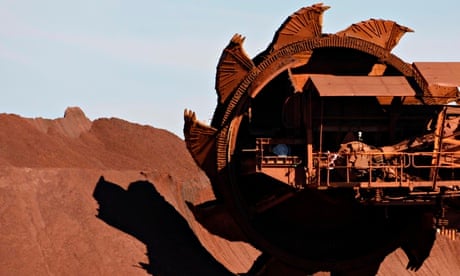One of the financial world's largest ever mergers was effectively unwound on Tuesday as BHP Billiton said it was demerging key assets from its $190bn (£114bn) mining conglomerate – triggering another huge payday for the banks.
The move effectively reverses the 2001 tie-up between BHP and Billiton, a deal which at the time created a near $30bn company and allowed bankers and lawyers to charge $92m for their advice.
Paul Gait, an analyst at Wall Street broker Bernstein, said: "The main beneficiary of the proposed demerger would appear to be the multitude of advisers that will no doubt require significant compensation for helping structure the deal. In the absence of a compelling valuation case for the demerger it is unclear how BHP's existing shareholders will be compensated for this cost."
The latest transaction sees Goldman Sachs leading a team of investment banks – which reportedly also includes UBS, the Swiss bank that was the main adviser to BHP on the 2001 transaction, as well as Gresham, which represented Billiton on the original deal. The mining group declined to say how much it would be paying its advisers this time.
After 13 years as a combined entity, the miner now plans to hive off a collection of unwanted aluminium, coal, silver and manganese mines and plants into a separate company.
Garry White of stockbrokers Charles Stanley said: "Although not an exact match, the move effectively undoes the 2001 mega-merger that created the company, with most of the assets in the spin-off being traced back to Billiton. Indeed, it could be argued that, with hindsight, the 2001 merger was a boon for Billiton shareholders, but not so much for investors in Broken Hill Proprietary Company."
Billiton's main assets in the 2001 merger were the Hillside and Bayside aluminium smelters in Richards Bay on South Africa's east coast, the Mozal smelter in neighbouring Mozambique, and energy coal mines in South Africa – all of which will make up part of the new company. Meanwhile, shortly after the merger, BHP's main assets of iron ore, copper, coking coal and oil suddenly found themselves in booming markets as prices soared on the back of surging Chinese demand.
BHP Billiton said that once it had simplified the group it will be almost exclusively focused on its large iron ore, copper, coal, petroleum and potash businesses. "With fewer assets and a greater upstream focus, the group will be able to reduce costs and improve the productivity of its largest businesses more quickly," the company's statement said. "As a result, its portfolio is expected to generate stronger growth in free cash flow and a superior return on investment".
The chairman, Jac Nasser, added: "For over a century, BHP Billiton has progressively reshaped its business to maintain its industry leadership. We believe the proposed demerger, if implemented, will accelerate the simplification of the group's portfolio, provide investors with choice and unlock value in both companies. Our shareholders will have the opportunity to vote on this proposal once the necessary approvals are in place".
Despite Nasser's upbeat tone, BHP Billiton shares shed almost 5% on the announcement, losing 102p to £19.65, as investors reacted to the streamlining of their company.
Existing shareholders will be given shares in a new company containing the demerged assets, although the business will be listed in Australia and South Africa. This move is likely to create an added complication for UK fund managers, many of whom have mandates that only allow them to own shares in British companies.
Andrew Mackenzie, BHP Billiton chief executive, added: "The assets that would form the new company are not of the same size as those in our major basins but many are among the largest and highest quality in their sectors. We believe they will be more valuable in a purpose built, independent company than they would be in BHP Billiton. With experienced management and a strategy and cost structure tailored to the scale of its businesses, the demerged company would be well placed to create substantial additional value for shareholders and rewarding careers for employees."
However, Albert Minassian, an analyst at Investec, said: "Although we are cautious on divestments involving such a broad range of commodities done at a low point of those assets' earnings cycle we think this strategy makes sense but struggle to show significant increase in value compared to our existing estimates".
